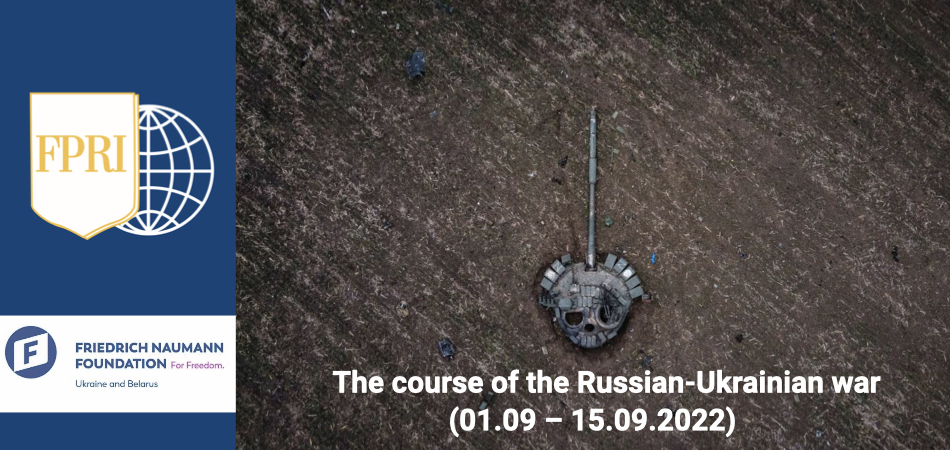
Source: Army FM
- Changes at the front
Ukraine has won the first two stages of the war, withstood the offensive at the beginning, stabilized the front and launched a counteroffensive in the Kharkiv and Kherson regions. Now the Ukrainian army is faced with the task of winning the last stage, which should end with the complete expulsion of the Russian army from the territory of Ukraine.
According to the Commander-in-Chief of the Armed Forces of Ukraine Valery Zaluzhny, for the Ukrainian Armed Forces, the further situation will be a complex combination of the actual position of the line of contact, available resources and a set of combat-ready troops, and, obviously, finding the strategic initiative in the hands of the enemy. The only way to radically change the strategic situation, according to Zaluzhny, is to deliver several successive, and ideally, simultaneous counterattacks by the Ukrainian Armed Forces during the 2023 campaign. The main blow should fall on the "center of gravity" of the Russian army. Since there is no clear definition of the Russian center of gravity, the Commander-in-Chief of the Armed Forces of Ukraine suggests that it could be Crimea.
The preparation of an offensive campaign in Crimea requires the creation of one or more operational (operational-strategic) groupings consisting of ten to twenty combined-arms brigades, depending on the plan and ambitions of the Ukrainian command. In the current situation, this can only be done by replacing the main weapons of existing brigades with modern ones, which are provided by Ukraine's partners. Separately, the need is emphasized to obtain from partners an additional number of missiles and ammunition, artillery systems, missile systems, electronic warfare equipment, etc. All this will require the consolidation of efforts of all partner countries of Ukraine, a long time and large financial costs.
Valery Zaluzhny also emphasizes the disparity in the capabilities of Ukraine and the Russian Federation and notes that the center of gravity of the Russian Armed Forces should still be considered the ability to deliver pinpoint strikes on targets deep into the territory of Ukraine with impunity. Equipping and re-equipping the Armed Forces of Ukraine with weapons systems of the appropriate range, to reduce the disparity between the Armed Forces of the Ukraine and the Armed Forces of the Russian Federation, can change the course of the war. An example of the effectiveness of strikes in the depth of Russian forces is strikes against Crimean air bases.
Thus, the success and effectiveness of the counter-offensive depends on a possible decision regarding a comprehensive approach to the re-equipment of artillery, missile forces, tactical aviation and the Naval Forces of the Armed Forces of Ukraine, reducing the disproportion in the means of defeat and conveying the nature of the war to the Russians - in the way that was applied in Crimea to make their feelings about the war sharper, more natural and quite tangible, despite the considerable distance to the targets.
- Military assistance
In the first half of September, Ukraine has received the following weapons:
USA:
- 105-mm M927 high-explosive rocket shells for M119 howitzers
- M982 Excalibur artillery ammunition
- Repair and evacuation vehicles M984A4 HEMTT (the number of transferred vehicles is unknown)
Finland:
- A batch of military aid for the Defense Forces of Ukraine worth 8.3 million euros
- Sisu XA-180/185 armored personnel carriers (Quantity unknown)
Denmark:
- Military uniform and winter clothing
Norway:
- 160 laser-guided Hellfire missiles, launchers and guidance units
- Night vision devices
Spain:
- 75 pallets with 155-mm ammunition
Lithuania:
- 105-mm howitzers M101 (quantity not specified)
FRG:
- Counter-battery radar "COBRA"
- ZSU "GEPARD" (5 units)
Lithuania:
- M113 armored personnel carriers (Quantity not specified)
Source: Mil.ua
- Russia: internal and external challenges
The Ukrainian counteroffensive in the Kharkiv region dealt a powerful blow to the morale of the Russian army and Russian propagandists. Against the background of the events, Foreign Minister Serhiy Lavrov said that Russia had not given up on negotiations with Ukraine. Kremlin spokesman Dmitriy Peskov, in turn, refused to comment on the counteroffensive of the Armed Forces of Ukraine and redirected journalists to the Ministry of Defense of the Russian Federation. However, the Ministry of Defense could not give a plausible explanation. The statement regarding the regrouping was criticized even by some Kremlin war correspondents, and on Russian television the military defeat was recognized. In contrast to the defeats near Kyiv and Snake Island, the Russians in the Kharkiv region could not leave the occupied territory in an organized manner. Instead, the occupying forces ran, leaving their positions in panic and dropping hundreds of pieces of equipment.
Therefore, this time the Kremlin could not pass off a military defeat as a "gesture of goodwill." Vladimir Putin's rhetoric was restrained: "We see activity both there and there (at the front - ed.). Well, the Kyiv authorities have announced that they have started and are conducting an active counter-offensive operation. Well, let's see how it ends" - the head of the Kremlin said. This time, Putin did not threaten Ukraine and its partners, after all there is no capacity for escalation, or a symmetrical response, except for the use of nuclear weapons, or terror of civilians in Russia. The weakness of the Kremlin dictator was felt both inside Russia and on the international arena. Therefore, a group of deputies from St. Petersburg appealed to the State Duma with a proposal to bring charges of treason against Putin, while local deputies from Moscow called on Vladimir Putin personally to withdraw the powers of the president of the Russian Federation.
Further military defeats of Russia will contribute to the increase of discontent within the state and the first alarm bells for the current Russian authorities may turn into a change of Putin's regime.
